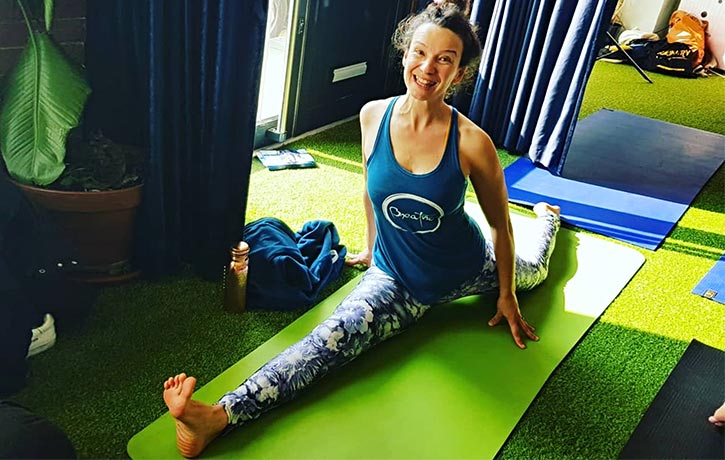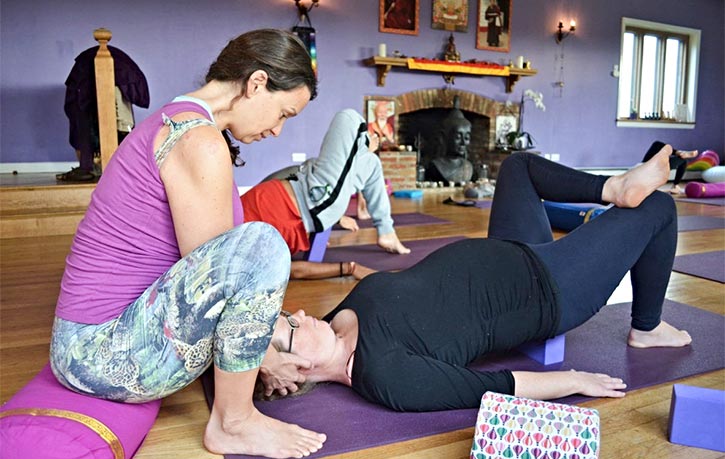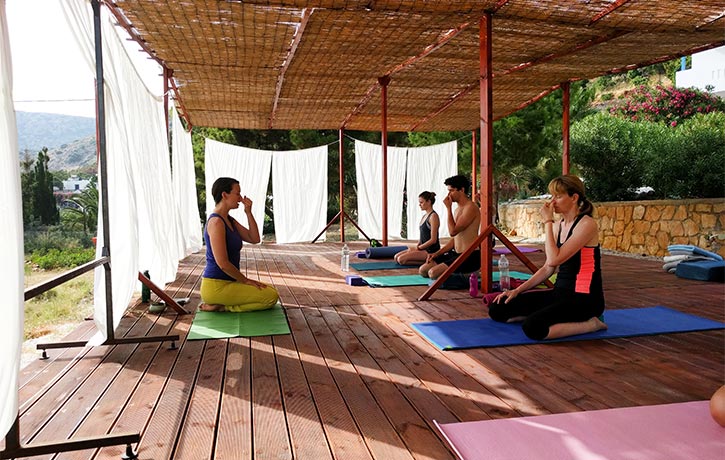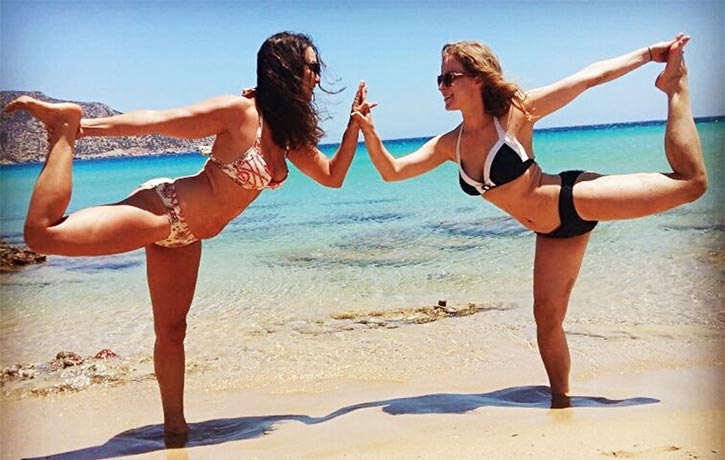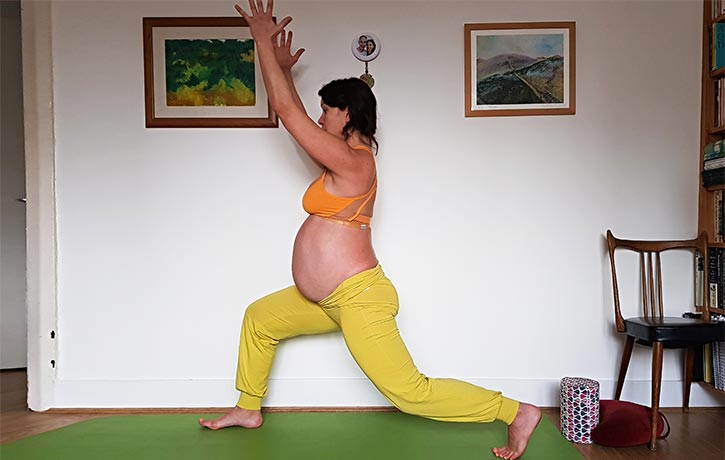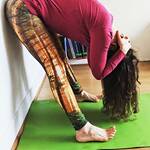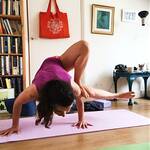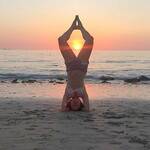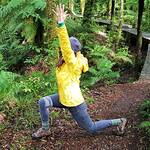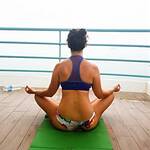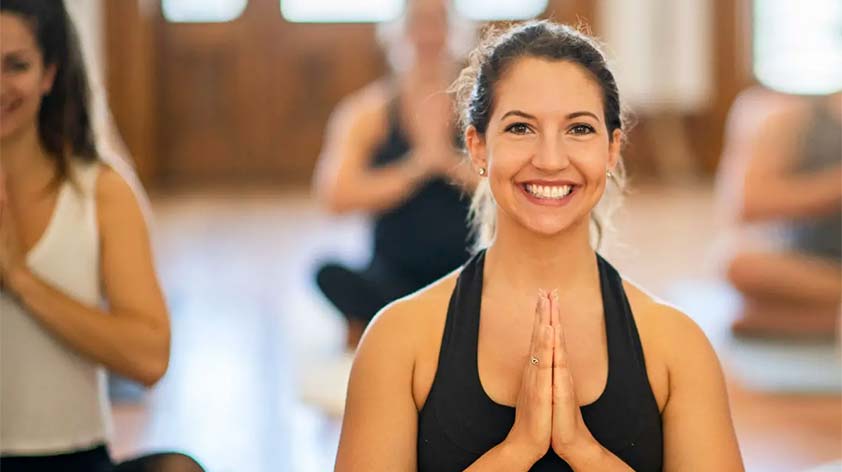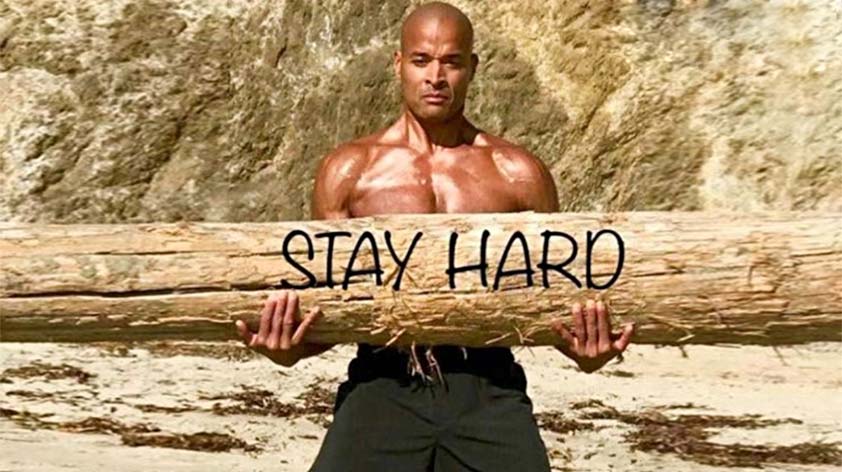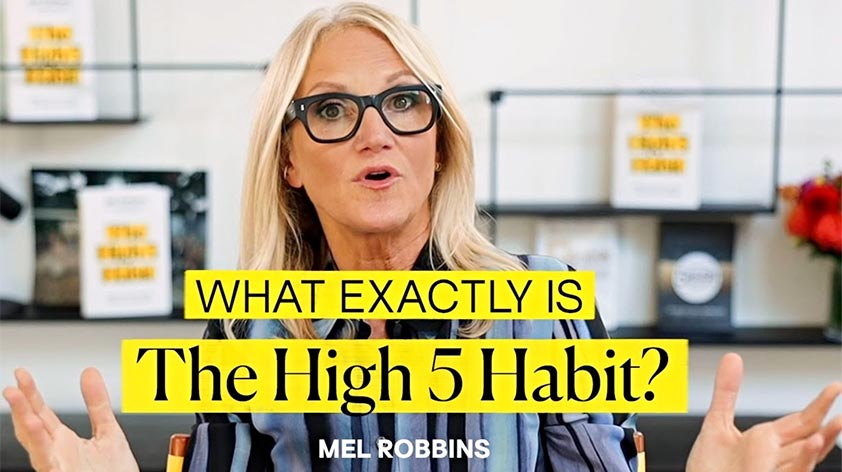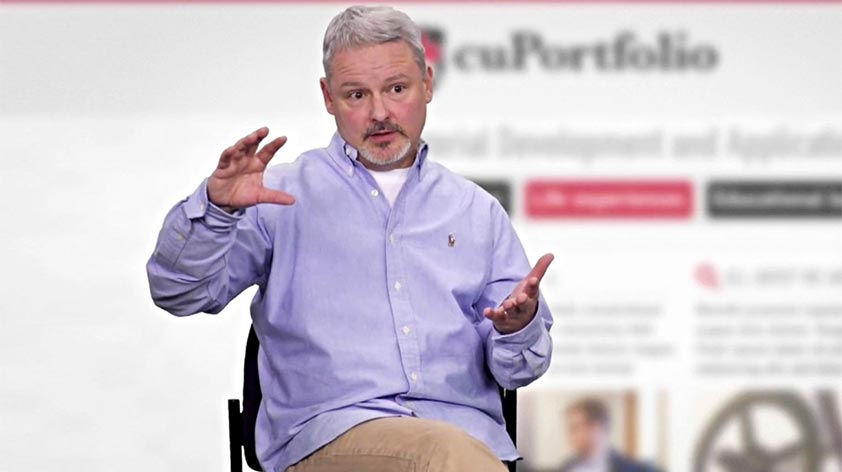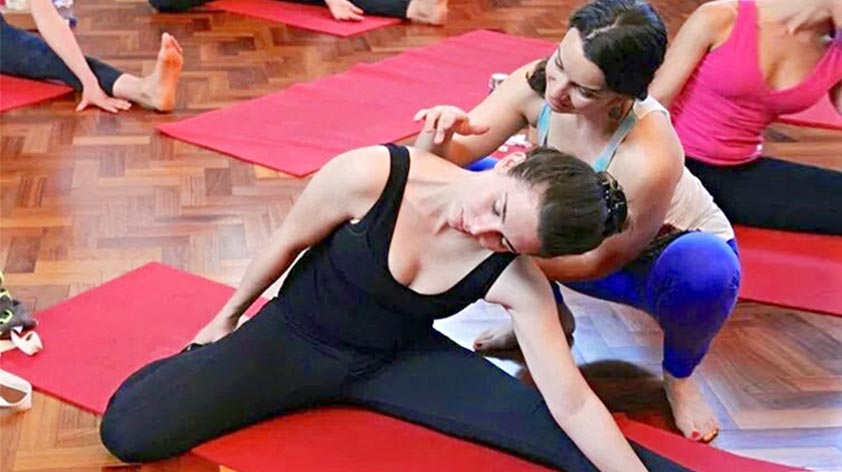
Dr. Thuli Whitehouse is an NHS GP, social prescribing advocate, mom and yoga instructor. She is working tirelessly to bring the many psychophysical and wellness benefits of yoga into mainstream healthcare practice. Her reasons for doing so include educating patients toward more personalised selfcare solutions and encouraging them to participate in their own journey to optimum health.
We had the recent opportunity to interview Dr Thuli, (Thuli means “quiet strength” in Zulu) and found her passion, dedication and commitment to her mission a refreshing pleasure to hear and share. Read on for this special extended feature with Dr Thuli.
Hello Dr Thuli,
It’s great to connect with you and we hope you’re keeping well. Welcome to Keep Fit Kingdom and thanks so much for taking some time out to share your views with us. Have you taken a look at our site?
Yes, I did. I saw a good line up of articles on it. Interviews, recipes and more.
What do you think of the name Keep Fit Kingdom (or KFK for short)?
I think it’s great, alliteration is always good and it has a nice ring to it.
Our mission is to help a billion people reach 100 years of age happily and healthily by the year 2100, what are your general impressions?
I think it’s a great ideal. More and more people in our population are ill and aging, and we have all those sorts of problems. It’s a problem for them and for society, so if we can live old and live well, then that’s a great idea!
Thank you. Okay, so let’s start off with some basics
Background
What made you decide to get into the medical profession?
It’s quite a big question and a big decision given the amount of work, dedication and years of your life that are involved. I think I’ve been very preoccupied from quite a young age, from childhood with doing something important and meaningful with my life. Healthcare just seemed the most fundamental way that I could help people, because without your health you have nothing.
I loved arts and science at school and medicine is just the perfect mix of both of them, because you’re working with scientific principles and people. I love people, interaction, conversation, and my interest in psychology is really what led me to doing general practice. But then it’s also a neverending journey of learning as well. It’s always changing and we continually need to learn, so you’re never sitting still and getting bored. You have to always be learning and changing your concepts. I love learning and that continual life process of learning, I think that’s what life is really all about, building knowledge and eventually becoming wise, I think.
NHS Career & the role of yoga in healthcare
All about growing. So, what is the main focus of your work right now, and what are you aiming to accomplish?
Within my work, as a GP and a yoga teacher, (and from the beginning of medical school) I have always been very interested in a more integrative approach to healthcare. I knew that the traditional medical system had a lot of flaws in it and it wasn’t everything that we needed so I’ve always been exploring these other areas.
Yoga has become a way for me to concentrate on the idea of holistic healthcare. So I suppose my aim is to bring psychological and physical wellness to people, and support them on their journeys making healthcare more sentient, bringing more of the humanity back into it. I think modern medicine has the tendency to disembody people, and take their problems away from them, to be dealt with by someone else. But actually we need to re-embody patients, we need to bring them into the centre of their health and wellness journey. We talk about illness, but actually it’s about building wellness.
About people taking responsibility?
Exactly! So responsibility in healthcare is a big thing, and building agency in people – actuating them so they’re able to make positive choices about their own lives because that’s the only way really, that we can build health, build wellness and a happier society, and getting people to live to a hundred!
So, how do you think the landscape of healthcare will evolve in the next 5 years?
I think it’s beginning to happen already, we have reached a kind of critical point in healthcare where the current model is reaching its limits with its escalating costs and diminishing returns, so we need a new paradigm. I believe that this new paradigm is beginning to come in and it’s more about selfcare, healthcare and building wellness and stepping away from over-medicalisation and over-intervention. Over-intervention is a big thing I think, maybe less so in the UK than say, in the US or other countries but it’s still a big problem here. We’re getting back towards re-embodying people, getting them to care for themselves. So for the new NHS health plan which has just been released this year, they’re rolling out social prescribing [Note .“Social prescribing is a way for local agencies to refer people to a link worker. Link workers give people time, focusing on ‘what matters to me’ and taking a holistic approach to people’s health and wellbeing” -NHS England] around the whole country and I recently presented a workshop at the Inaugural Yoga and Healthcare Conference, so there’s a big drive in trying to get yoga integrated as a central part of social prescribing. So I am involved in this movement moving yoga more into the NHS as well. I think we are beginning to make steps in that direction, so we’re at the turning of the tide.
A great turn, probably long overdue.
Yes and I think organisations like yours are fantastic, it’s all a part of this paradigm shift.
Perspectives on the NHS
With that said, why do you think the NHS is a little sluggish in taking up new ideas on health and wellness?
Well yes, it is and because it’s a huge organisation. The NHS is the fifth largest employer in the world, after Indian Railways and the Chinese (People’s Liberation) Army. The founding principle of the NHS is healthcare for all, but in order to provide that, everything that’s decided about the NHS has to be rigorously evidence-based and it has to go through due process in order for it to become policy. That’s why it’s so slow, and that’s a negative thing, but that’s also a good thing because it creates stability, and it stops money-making influencing doctors’ decisions to investigate and treat their patients’.
Saving money is the reason decisions are made, not spending too much money which is the problem with privatised healthcare I think. So, it’s kind of the bane of the NHS but also the other side of the coin is that’s what keeps it stable and safe.
I think the other big problem is that because it’s the National Health Service and such a political issue, the government retains control over it, when actually they should probably be handing that control over to healthcare providers who really know what’s going on. However, since it’s such a political tool, they won’t do that and there are a lot of top-down decisions made that probably aren’t the right ones. So politically-based changes are made, just because a new government has come in rather than what is actually the right thing for the NHS.
I don’t know if and when that’s ever going to change but that’s another part of the issue. I think ultimately, change has to come from the grass roots, from charities, and from organisations like yours, helping facilitate social prescribing. There are lots of small projects going on around the country and the world that are working toward this change, nudging their policy makers, and the people higher up who are actually making these decisions, it’s happening slowly but surely.
If there was one thing you could change in the NHS right now, what would it be?
That’s a good question. I guess it would be people’s belief that medicines are what are going to cure them which is very wishful thinking and not something you could change just like that. I would love to change the inherent belief in our society that medicines make you better and that you can take a pill for everything.
It’s very much the minority that realise that you can only change yourself, beginning with the decisions you make in your life and the way that you look after yourself. But if everyone could understand that, that’s the message that I’d love to be more widespread in the NHS. Also for doctors to really understand that, as we are very trained to understand disease, and basically, the solution that we’re mostly trained to provide is drugs. Patients need to understand that, as well as the doctors.
- Getting more flexible each day
- Dr Whitehouse assists during a yoga class
On medicine
How necessary do you believe prescription drugs are, and is it possible to dispense with medicines entirely?
No, I don’t think so. This is an argument, that I feel I’ve been making, you shouldn’t throw the baby out with the bath water. We do need both of these things. You know, if someone had a car accident or a heart attack, or if something incredibly urgent happens, they’re going to need to go into intensive care, they’re going to need to have some drugs to sedate them, and antibiotics to prevent a chest infection. We do need medicine for certain situations. The problem is using that same treatment to treat illness that would be better managed by other things. That is more chronic, and lifestyle diseases, or mild psychological issues. But severe schizophrenia, for example, needs a drug. You cannot talk someone down from a psychosis, you need to give them a drug so that you can get them to a place where they can be responsive to therapy. Equally we shouldn’t be medicating our happiness and that definitely happens as well. So there’s this somewhere in between, and we’re a little bit shifted in one particular way at the moment.
How far do you think fear and big pharma (marketing) ‘conditions’ people into thinking they must rely on medication?
That’s a tricky, kind of chicken and egg situation. The industry is there, because people want quick fixes. Nobody wants to be told that they have to go away and do exercises every day. They want to go and just be cured with a pill or a treatment, so people don’t like being told they have to work at things.
It is a lie we like to tell ourselves. So it is kind of self created. Equally, big corporations do have a huge responsibility because they are the ones controlling what is available, in terms of medication, in terms of food, the huge food industry is equally culpable. With a capitalist society it’s difficult to make a company have to take responsibility. And equally, there are a small number of organisations that are being aware or conscious of how they’re running and how they are organising. So yes I think it has influence, but it is not everything. We can’t move forward without responsibility, we have to start with each one of us as well.
Food as medicine
Do you mostly agree with what Dr Rupy, who wrote “The Doctor’s Kitchen” books suggests – seeing food as your medicine?
Yes totally! We should be replacing drugs with better lifestyle diets. Again, food can’t be your medicine when you’ve just had a heart attack or if you’ve just had your arm chopped off. But if you’ve got diabetes, food 100% should be your medicine. If you’ve got high blood pressure, should food be your medicine? Well there are so many inflammatory conditions that respond well to dietary changes. So, yes, it’s incredibly important. One of my bibles that I’ve had for years, is a kind of food-as-medicine book called “Healing With Whole Foods: Asian Traditions and Modern Nutrition” by Paul Pitchford. It opens up the whole food debate, which has been going on since the 70’s, there are a lot of good books about that out there. Getting back to whole, real food – we eat several times a day, it’s what our cells are made of, so of course that’s what we can change to affect how we feel and our health. It’s a no-brainer, when you actually think about it.
So, would you say there’s not only a need to change our diet, but also our relationship with food as well?
Yes totally, mindful eating. Just setting aside a time for meals, rather than eating while walking down the street or watching TV.
Challenges facing GP’s & learning to breathe!
Okay, so what’s the most challenging and most rewarding part of your work?
There is so much that is challenging about my work. For example, managing patients that are in extreme distress can be quite challenging because that can become unpleasant, so that’s really hard. Managing yourself in the context of an angry, upset or distressed patient and maintaining your humanity at the same time is difficult.
Managing, as in being present there as a human being and empathising with the person in front of you, whilst simultaneously maintaining distance to look after yourself, I think is the biggest, ongoing challenge as a doctor. Not switching off to the person in front of you, but also looking after yourself at the same time. There is a special balance there, if you’re not distressed by anything you see, you’re obviously too switched off, but if you cry every time one of your patients die, you’re not going to last very long. That is no use either, so I think, keeping that balance between self preservation and empathy is probably the hardest thing!
Hard not to take it personally. And the most rewarding?
When a patient has a breakthrough of understanding and picks things up. I love it when I’m able to explain something in a way that helps a patient to really understand and create a shift in their awareness, and they get an expanded perspective on their illness or journey. I do a lot of explaining; I’ve been told that one of my main strengths is being able to explain things. I so enjoy the thrill of helping someone understand something about themselves.
A great gift. Based on the number of patients you’ve seen over the years, what would be your top tips to live happily and healthily to 100 years?
I think probably, the most important thing is to be kind to yourself, mentally. I think there is a huge amount of self-criticism that goes on in our society, and we talk to ourselves in a way that we would not talk to anyone else. So I think being kind to yourself, as we are to other people, or towards small children, that is probably number one. Sleeping enough! (I have a baby, just over a year old.) Sleep is like medicine, and I believe that it is very important to get quality sleep. That would be the second thing. The third is having a normal awareness around eating. Fourth, since I am a yoga teacher, let’s also use yoga. So deep breaths, build a relationship and be aware of your breath since it’s probably the most important key to regulating stress and can be used as a way to modulate how we’re feeling – and it can be tied into everything. So we need move using our breath, we need to down-regulate using our breath, we need to think using our breath. Yes, building a relationship with your breath!
If I’m a bit distressed, the first thing my colleague advises me is to breathe deeply.
It’s amazing, just 10 deep breaths.
In-depth discussion on yoga & the impact of meditation
You’re also a Forrest Yoga practitioner – what makes this particular practice distinct from other types of yoga?
Well I’ve practised yoga for 20 years this year, discovering Forrest Yoga 6 years ago. Learning Forrest Yoga made me realize how I mainly wanted yoga to be the focus of bringing this idea of of sentiency and self care into medicine. This is what I’d like to be my focus.
So Forrest is a modified and creative form of yoga, designed for the modern body and mind. It is designed to heal trauma and has a very strong focus on the use of the breath. It unwinds areas of tension generated by the way that we live, in our wrists, in our necks, in our shoulders etc. It builds strength when we are weak, in our core. It is amazing for healing injuries as well as preventing them.
Some yogas, done for a prolonged period of time, can result in back, wrist or shoulder injuries. Forrest is incredibly well-sequenced, and is a fabulous form of yoga. Anyone can do it. You can do chair Forrest Yoga and get all the foundational benefit. You don’t need a handstand, lotus or crazy flexibility. You can just do the Forrest basics for a healthy body and mind – it’s really great for that! The other aspect that sets it apart, is that in a class we are trained as teachers to do hands-on assists. Using our hands we can help people relax or become aware of parts of their bodies, so yes it is a very ’embodied’ form of yoga. I think that kind of touch is very important. You can help people to get deeper, but also you bring breath into areas of numbness. It is just really helpful to be adjusted and assisted in those ways and poses.
Is it not odd that many people still think “I can’t do yoga, because I’m not that flexible”?
Exactly, flexibility is a side effect of yoga, not a prerequisite. You do not have to be flexible to start.
So, looking ahead, what do you think the role of yoga will be in healthcare in the next 3-5 years?
Well, there is a Yoga in Healthcare Alliance which has formed, and there is also an all party parliamentary group to get yoga into healthcare. I think within the next 5 years the main area that’s going to be part of healthcare, is social prescribing. I think its role should be a component of chronic disease management. How do we get people to start losing some weight or eating better, and how are you going to do that in a 10-minute consultation? Well, the great thing about yoga is that it gives people back their bodies to make decisions about and to make them feel confident.
They can now have control over their bodies and do things to help themselves so what was once external becomes more internal, giving a sense of activation, and agency into their lives. So I think yoga is going to have a key role, to help deal with a very big problem – that people aren’t willing to take responsibility for themselves and doing yoga helps to engender that.
It definitely activates a process of growing awareness. How do you believe meditation actually influences or affects health?
Well, yoga is moving meditation. Meditation is about self-awareness as well as being the path to enlightenment. Yoga is a method of physical preparation to get the body ready for meditation, traditionally speaking. We are so far removed from that in our society and the thing that meditation is important for in our society, is just in settling the mind. It’s in giving people a little time out, relaxation, down-regulation to deactivate the sympathetic system and activate the parasympathetic system.
Bringing people into that calmer state, where they can make better decisions about themselves and feel within themselves, instead of just being in their heads. Meditation and yoga both do that and really we should all be doing both of them. Yoga just has the added benefit of moving the body as well.
Many remain in stress or even survival mode for long periods. Do you think that meditation is as important as yoga given the rise of such psychological issues as ADHD, ADD, anxiety and growing stress in general?
Yes I think meditation is incredibly important, and the good thing about meditation is that it’s much more easily accessible. You need nothing to meditate! You don’t need space, you don’t need a mat or different clothes, you can even do it on the tube. I used to do it on the underground all the time when I was travelling around London. You can literally do it anywhere, you don’t even have to close your eyes. Meditation is a state, it’s a calming activity. Meditation really could transform the world if everyone did it.
- Yoga retreat
- Dr Thuli Whitehouse gets sun sea and yoga
- Yoga is highly recommended whilst pregnant
I know plenty of people that say “I can’t meditate!”
Yes, that’s because they think meditation is the absence of thoughts, and that’s just not the case. The reason people say that they can’t meditate is that it’s a bit scary, the first time you sit and actually notice the kind of nonsense you say to yourself, all the crap that is active in you. That can actually be such a frightening level of awareness. When I first started meditating, I went through this phase of “My God, I am such a horrible person!” I think all these really critical things about other people, and myself. “I can’t believe I think and talk about myself like that!”, it really upset me. And we’re not even aware we’re doing it. We think it’s the truth, and it simply isn’t.
The first thing I thought when I started meditating was, “Do I have ADHD or ADD?” (Both laugh)
Oh yes, it’s insane! The mind is insane. And I also know people that say, “Yes, but I cannot thínk any less!”, but actually it is about the quality of your thoughts. I think so much less now, but the quality of my thoughts is so much better and that nonsense is so much more stripped away. If you just weed that stuff out then you can actually hear the internal voice of guidance, that’s the thing you really want to listen to, not just the critical rubbish.
Thought as medicine
How about thought as the new lifestyle medicine, is that on the horizon, what do you think?
Yes! I think most people are a long way from that. When I was at Swami Sivananda’s ashram in Rishikesh, (India) I bought his book called “Thought Power”, which is all about the power of thought. Negative thought is almost as bad as negative action etc.
Thought is where it all starts…
Yes, thought, word, action, it’s a sequential thing. Obviously it’s better to think about killing somebody than to actually kill them. But even so, having that thought is not good for you or the universe.
Well before that, we need to get everyone meditating and having an awareness of their thoughts. The idea of thought as medicine is not going make sense to anyone unless they’ve meditated. That will take more than the next 5 years, I think!
You never know, the world moves in mysterious ways.
Yes, rapid shifts may happen and such changes can be quite parabolic.
Healthcare & the internet
OK, so, how has the internet affected healthcare?
Both good and bad, I would say. It can generate a lot of fear, because people can read all kinds of things, a lot of which isn’t true. But overall I would say it has a positive effect. A patient with a symptom who uses the internet in a measured way can come in with a suggestion about something I might not have even thought, learned or heard about, as it could be very new. In that sense, it’s a great thing, so aside from the fear creation side of it, the internet is also a huge and amazing educational tool. It is very leveling, and almost everyone can access it, with information sharing being so much easier.
Years ago two people could be making the same discovery on opposite sides of the world, and they wouldn’t know about it for forty years, whereas now with the internet, scientists on one side of the world can be working on something and know what’s happening on the other side of the world. Overall I think it’s a positive thing, but there are dark sides to it as well.
Do you think doctors should interface more with patients using virtual methods, such as Skype calls / Zoom calls or Private Messaging on social media platforms like Facebook, Twitter or Instagram?
Yes. Certainly to some extent it’s already happening on, for example, remote Scottish Islands where they don’t have a lot of specialties, like managing urgent or specialist things. So, that’s an area where it has to be done like that. It’s a positive thing that’s going to increasingly happen with GP surgeries as well. And while it’s not as good as face-to-face, if it means that people can be seen and helped sooner and quicker and by a more appropriate person, then it’s got to be a good thing. We’re using email, remote consulting and the telephone more, the rest will be coming soon.
Go-to exercises
Good. So, what are some of your other favourite exercises, in the gym or without any equipment?
It’s got to be yoga really! My favourite yoga poses are probably some Forrest specific ones, like turbo dog and dolphin, and I love a cobra. I think the cobra is such a subtle but powerful posture. You don’t really see much going on, but there is so much going on if you’re doing it properly, it works the whole body. And lunges, I love a good lunge.
On Diet: Vegetarian, vegan & go-to foods
We’d heard recently that, Prince Harry is going to have his baby be vegan – what do you think about that – what are your thoughts on veganism and plant-based diets?
I didn’t know that. I think it’s dangerous for a very young baby to go entirely vegan. I have never been vegan, but I’ve been completely vegetarian for about 15 years and a pescetarian for about 5. Now I am not rigid about what I eat, I never eat beef or pork. But I do occasionally eat a bit of chicken, and lamb but we’re basically vegetarian. I massively disagree with the industrialisation of the animal farming industry, and I think, we as a society eat far too much low quality meat – the planet could be “saved” and our health could be massively improved by eating less meat and eating a more plant-based diet. I don’t believe in the absolutism of veganism and vegetarianism anymore, but I do believe massively in reducing the amount of meat and dairy that we eat.
For a baby, you have to be careful and very intelligent with veganism. If you’re going vegan, you have to think a lot about what you eat. I think with a tiny baby it is a little bit dangerous. You have to make sure it gets the correct vitamins, etc. Given their position however, I’m sure they would have a personal nutritionist on hand, but the average person cannot afford that.
What are your preferred go-to foods that help keep you at your energetic best?
Well, I love almonds, unsulphured apricots and dark chocolate. They’re my favourite kind of snacks, I would say. Otherwise kale, I love kale smoothies.
Kale goes well with mature cheese, in pasta dishes for example.
You mean a cheese and kale pasta? That sounds really good. I make a kale pesto, that tastes really great. I will try it with some mature cheese!
Are you into juicing or smoothies?
Juicing not so much, but I’ve got a Vitamix, so I make a lot of smoothies. I prefer to drink the whole thing. I do drink juices but I’m more into smoothies.
From your experience, what do you suggest is a sensible diet that would suit most people?
I think it’s hard to generalise as people have different needs. But I guess the most fundamental principles are eating fresh food every day, and eating whole food. That is as far as you can go really. Within that it will vary, some people have intolerances to different foods and some do better when eating fish or meat, some are better as vegetarians or vegan even. But eating fresh, whole foods, that include daily vegetables is foundational.
Insights, tips & advice
What are your views on human potential briefly?
I would say overall, hugely positive. I am definitely more of an optimist than a pessimist, and everyone has the potential to grow, it’s not easy though, but we need to make the effort. We all have the capacity however, and that is what my life’s mission is really, just helping people on their journey. The most important thing is to keep moving and to keep growing. There is no backwards.
What’s your best energy management tip?
I think, having self awareness and noticing that if you get into an overwhelmed state, to call for some time out whenever that happens, and taking deep breaths. Deep breaths are always the beginning point of rebalancing, like coming back to yourself. Know when you need to stop, or change your action.
What advice would you give to an ambitious, driven medical student about to enter the “real world”?
First, look after yourself, because no one else is going to do that, and second, just learn to stay centered in yourself. Find what interests you and don’t be pushed in any direction. Only do what you feel able to do, don’t take on too much responsibility. You’re going to be most useful when you’re looking after yourself and in a place where you’re doing as much as you want to be doing. Overwork is a big problem in medicine, and in all of society. I think if we all worked a little bit less, the world would be a happier place.
What advice should be ignored?
Just anything that doesn’t ring true. I love the phrase “remove the smog from your life, the should, the must, the ought and the got-to”, that would probably be it.
What ‘bad recommendations’ do you hear in your profession that get under your skin?
Not so many, but I think we have a tendency to medicating a bit too much. But I don’t think any one is doing anything overtly bad. The medical profession is full of dedicated, caring, and wonderful people in the main. It’s as much about systemic issues as the individuals.
- Dr Whitehouse stretches out
- Dr Whitehouse does advanced yoga Dragonfly pose
- Forrest Yoga on the beach
- Dr Whitehouse goes for the Warrior pose
- Dr Whitehouse meditates in a spare moment
Fun & Leisure
A few quick fire questions now. What’s one geeky thing about you that people don’t really know?
My partner is a complete computer geek, and he calls me a yoga geek. I love organizing things, like my socks or my clothes or my books. One of my greatest pleasures is organising my belongings. That’s pretty geeky. Even the toiletries in my bathroom, I love organizing them!
What are some of your hobbies?
Well, I don’t really have any anymore, now that I have a baby. One thing that I maintained that has some resemblance of a hobby is my yoga practise, and yoga teaching. My other hobbies used to be going out dancing, listening to music and rock climbing, things I’m not doing anymore.
What is your favourite music?
Probably folk music.
Favourite movies?
“I Heart Huckabees” and “Harold and Maude”.
What are your top 3 favourite books that have inspired you most so far in the areas of medicine, health, self-development or spirituality?
“A New Earth” by Eckhart Tolle. I think his second book is a bit more easy to read than his first one “The Power of Now”. It has ideas about the planet as well, which I think is important.
Ana Forrest’s book “Fierce Medicine” and “A Fortunate Man”, which is by John Berger, he died recently, he’s an amazing writer. The book is all about the life of a GP in rural Wales in the 50’s, but it’s the most amazing dedication to what it means to be a GP. Even though it was so many years ago, it still rings so true as to what it means to be a GP. It’s a really inspirational book. I have a fun fact about that book, it’s actually written about a GP, who was the principle GP in a practise where my grandfather used to work, and this man took over when my grandfather changed specialities and trained as an obstetrician. I actually have a signed first edition copy from my grandfather. It’s a really a great book!
On Reflection…
An extra personal bond there. So, what’s your proudest accomplishment so far?
I would probably have to say my son. He’s probably the best thing I’ve produced! (Laughs).
What dreams do you still wish to achieve?
Bringing sentience back into healthcare, building awareness and agency among the population. I’m keen to be one of the proponents and speak about that.
Another thing I’m proud of is this doctors and wellness retreat, which is on its 4th year now – so, I’m quite excited about that. Growing that, as well as building mindfulness and awareness, and bringing that to healthcare professionals is really a great way of spreading it. Unless doctors understand the experience of meditation, they are not going to suggest it to people.
What are you most grateful for?
Being alive really, my health, and having found my life partner as well.
Great gifts. As we’re about to wrap, what are a couple of life quotes or motivational sayings that inspire and motivate you to be and do your best?
My favourite, “Live with skillful nonchalance and ceaseless concern” which is a sutra from the “Prajna Paramita”. (Ed. note: a teaching known as the ‘Perfection of Transcendent Wisdom’ from Mahāyāna Buddhism)
Finally, what special message would you like to share right now with Keep Fit Kingdom readers and those that know you?
Thank you to everyone who has shared in my life so far, and I can’t wait to meet the rest of you!
Thank you, Dr. Thuli, for your kind participation in this interview. We really do appreciate you taking the time to share your valuable wealth of experience and insights with us!

